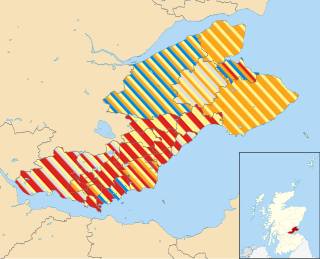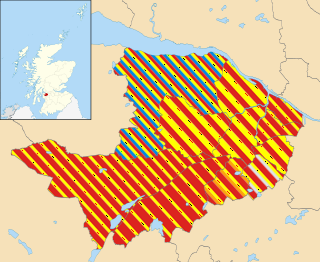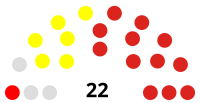
Elections to Angus Council were held on 3 May 2012 the same day as the other Scottish local government elections. The election used the eight wards, created as a result of the Local Governance (Scotland) Act 2004, with each ward electing three or four Councillors using the single transferable vote system a form of proportional representation, with 29 Councillors being elected.

Elections to Dundee City Council were held on 3 May 2012 on the same day as the other Scottish local government elections. The election used the eight wards created as a result of the Local Governance (Scotland) Act 2004, with each ward electing three or four Councillors using the single transferable vote system a form of proportional representation, with 29 Councillors elected.

Elections to Glasgow City Council were held on 3 May 2012, the same day as the other Scottish local government elections. The election was the second using 21 new wards created as a results of the Local Governance (Scotland) Act 2004, each ward elected three or four councillors using the single transferable vote system a form of proportional representation.

Elections to Fife Council were held on 3 May 2012, the same day as the other Scottish local government elections. The election used the 23 wards created as a result of the Local Governance (Scotland) Act 2004, with each ward electing three or four Councillors using the single transferable vote system a form of proportional representation, with 78 Councillors elected.
Elections to Clackmannanshire Council were held on 3 May 2012, the same day as the 31 other local authorities in Scotland. The election used the five wards created under the Local Governance (Scotland) Act 2004, with 18 Councillors being elected. Each ward elected either 3 or 4 members, using the STV electoral system.
Elections to Inverclyde Council were held on 3 May 2012, the same day as the other 31 local authorities in Scotland. The election used the six wards created as a results of the Local Governance (Scotland) Act 2004, with each ward electing three or four Councillors using the single transferable vote system a form of proportional representation, with 20 Councillors being elected in total.
Elections to Falkirk Council were held on 3 May 2012, the same day as the 31 other local authorities in Scotland. The election used the nine wards created under the Local Governance (Scotland) Act 2004, with 32 councillors being elected. Each ward elected either 3 or 4 members, using the STV electoral system.

The 2012 West Lothian Council election took place on 3 May 2012 to elect members of West Lothian Council. The election will use the 9 wards created as a result of the Local Governance (Scotland) Act 2004, with each ward electing three or four Councillors using the single transferable vote system a form of proportional representation, with 33 Councillors being elected. The Bathgate Ward gained an additional seat for the 2012 elections. JAMAL The election saw Labour remain the largest party on the Council as they gained 2 seats. The Scottish National Party also made 2 net gains and significantly increased their vote share, outpolling Labour in terms of votes cast. The Scottish Conservative and Unionist Party retained their single seat on the Council and so to did the Independents. The Action to Save St. John's Hospital group were completely wiped out from the authority losing all of their 3 seats.

The 2012 Midlothian Council election took place on 3 May 2012 to elect members of Midlothian Council. The election used the six wards created as a result of the Local Governance (Scotland) Act 2004, with each ward electing three or four Councillors using the single transferable vote system a form of proportional representation, with 18 Councillors being elected.

Elections to East Lothian Council were held on 3 May 2012, on the same day as the other Scottish local government elections. The election used the 7 wards created as a result of the Local Governance (Scotland) Act 2004, with each ward electing three or four councillors using the single transferable vote system a form of proportional representation, with 23 councillors elected.

The 2012 South Ayrshire Council election took place on 3 May 2012 to elect members of South Ayrshire Council. The election used the eight wards created as a result of the Local Governance (Scotland) Act 2004, with each ward electing three or four Councillors using the single transferable vote system a form of proportional representation, with 30 Councillors being elected.

The 2012 North Ayrshire Council election took place on 3 May 2012 to elect members of North Ayrshire Council. The election used the eight wards created as a result of the Local Governance (Scotland) Act 2004, with each ward electing three or four Councillors using the single transferable vote system a form of proportional representation, with 30 Councillors being elected.
Elections to North Lanarkshire Council were held on 3 May 2012 on the same day as the 31 other local authorities in Scotland. The election used the twenty wards created under the Local Governance (Scotland) Act 2004, with 70 Councillors being elected. Each ward elected either 3 or 4 members, using the STV electoral system.

The 2012 Renfrewshire Council election took place on 3 May 2012 to elect members of Renfrewshire Council. The election used the eleven wards created as a result of the Local Governance (Scotland) Act 2004, with each ward electing three or four Councillors using the single transferable vote system a form of proportional representation, with 40 Councillors being elected.
Elections to East Dunbartonshire Council were held on 3 May 2012, the same day as the 31 other local authorities in Scotland. The election used the eight wards created under the Local Governance (Scotland) Act 2004, with 24 Councillors being elected. Each ward elected either 3 or 4 members, using the STV electoral system.
The next Elections to West Dunbartonshire Council will be held on Thursday 4 May 2017, on the same day as the 31 other local authorities in Scotland. It will be the third successive Local Council election to run under the STV Electoral System. The election will use the six wards created under the Local Governance (Scotland) Act 2004, with 22 Councillors being elected. Each ward will elect either 3 or 4 members, using the STV electoral system.
Elections to East Dunbartonshire Council were held on Thursday 4 May, the same day as the 31 other local authorities in Scotland. The election used seven wards created under the Local Governance (Scotland) Act 2004, a reduction of one from 2012, with 22 Councillors being elected, 2 fewer overall. Each ward elected either 3 or 4 members, using the STV electoral system.

Elections to Stirling Council were held on 4 May 2017, the same day as the 31 other local authorities in Scotland. The election used the seven wards created under the Local Governance (Scotland) Act 2004, with 23 councillors being elected, an increase of 1 from 2012. Each ward elected either 3 or 4 members, using the STV electoral system. Following the Fifth Electoral Review by the Local Government Boundary Commission for Scotland, minor changes were made to several of the ward boundaries and one additional Councillor was added moving the total number of Councillors from twenty-two to twenty-three.
Elections to North Lanarkshire Council were held on Thursday 4 May 2017, on the same day as the 31 other local authorities in Scotland. The election utilised the twenty-one wards created under the Local Governance (Scotland) Act 2004, with 77 Councillors being elected. This represented an increase of 7 seats and 1 additional ward when compared to 2012. Each ward elected either 3 or 4 members, using the STV electoral system.
The 2017 North Ayrshire Council election took place on 4 May 2017 to elect members of North Ayrshire Council. The election used the ten wards created as a result of the 2015–16 boundary review, with each ward electing three or four Councillors using the single transferable vote system a form of proportional representation, with 33 Councillors being elected.













